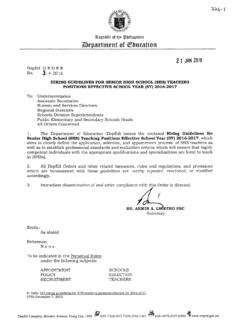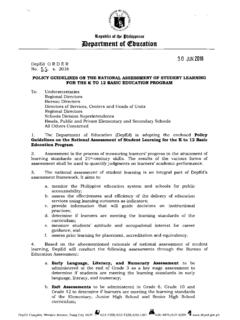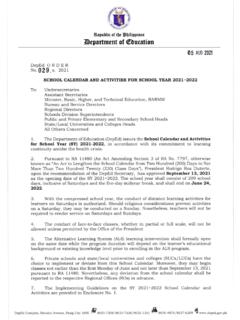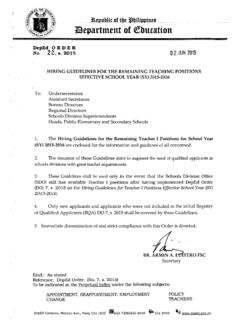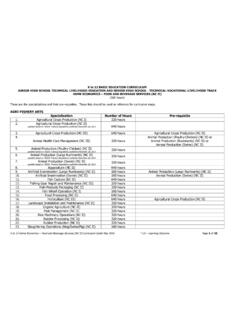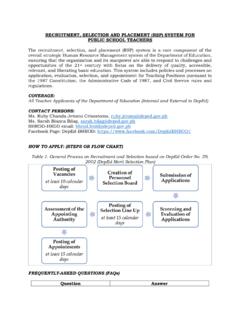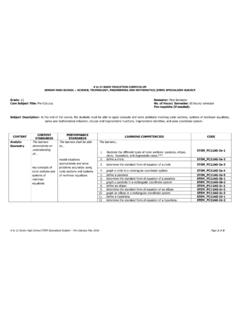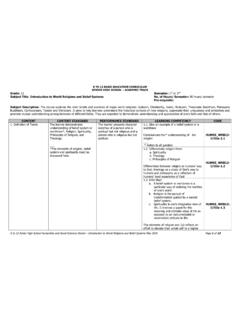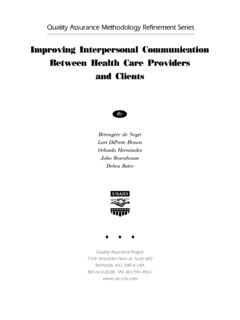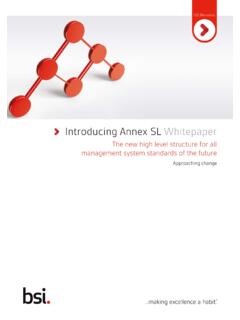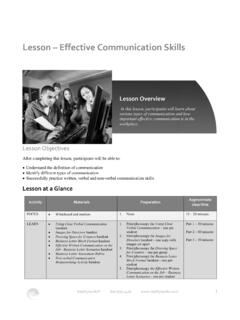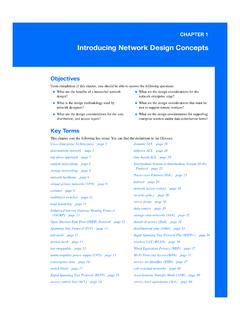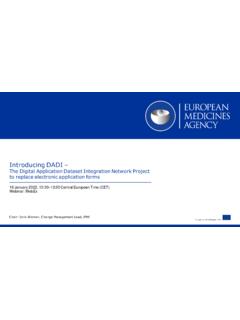Transcription of Module 2: Interpersonal Communication
1 Module 2: Interpersonal Communication Facilitator s Manual MYDev Life Skills Curriculum An Adaptation of EDC s Work Ready Now! Curriculum Module 2: Interpersonal Communication Facilitator s Manual Mindanao Youth for Development Project Life Skills Curriculum, adapted from EDC s WRN! Curriculum 2016 Education Development Center, Inc. All Rights Reserved. Page 2 Module 2: Interpersonal Communication Sa komunikasyon mahalaga ang unang impresyon The first impression you give is important in Communication . Interpersonal Communication Objectives By the end of the Module , participants will: Identify and demonstrate non verbal Communication Listen actively and speak appropriately Identify and practice good customer service skills Module Overview Activity Time Session 1: Listening & Speaking Effectively 4 hr 20 min 1: Introductory Activity & Learner s Reflection 1 hr 2: Non-Verbal Communication 35 min 3: Effective Listening 45 min 4: Effective Speaking 1 hr 5: Choosing a form of Communication 1 hr Session 2: Cooperating with Others 1 hr 45 min 6: Self-Assessment of Working in Groups 35 min 7: Cooperating with Others 1 hr 10 min Session 3: Customer Care 3 hrs 5 min 8: Giving Exceptional Customer Service 1 hr 10 min 9: Customer Service and the Role of Word of Mouth 45 min 10.
2 Module 2 Review and Application 1 hr 10 min Total Time: 9 hr 10 min Module 2: Interpersonal Communication Facilitator s Manual Mindanao Youth for Development Project Life Skills Curriculum, adapted from EDC s WRN! Curriculum 2016 Education Development Center, Inc. All Rights Reserved. Page 3 Module 2 Materials and Preparations Basic training materials: manila paper, markers, tape, A4 paper Make sure participants have their Participant s Handbook available. Session 1: Before the activity, ask for 2 volunteers to prepare a brief role play for Step 3 (below) Prepare a visual with the phrase in Step 3 (below) 1 paper ball (or another object that can be tossed from person to person) Review main concepts from previous Module Prepare a manila paper with the proverb (below) to discuss with learners.
3 Learners Reflection Review objectives of the Module Identify how non-verbal Communication plays a role in the next topics: listening and speaking skills Make 3 copies of Facilitator Tool : Listening Scenarios and select an appropriate role play to use with the participants or create a new one Before the activity, ask for volunteers to prepare the role play, give them a copy of the role play and brief them on what they will need to do Handout : Effective Listening Observation Form Make 3 copies of Facilitator Tool and select an appropriate role play to use with the participants or create a new one Before the activity, ask for volunteers for the role play. Give them a copy of the description of the role play and brief them on what they will need to do Handout : Effective Speaking Skills & Strategies Handout : Three Forms of Workplace Communication .
4 Session 2: Handout : Working in Groups Self-Assessment Handout : Cooperating with Others Roles Make copies and cut-out the roles for all participants from Trainer Tool : Roles for Actors and Observers Handout : Elements of an Effective & Cooperative Team Member Session 3: Before the activity, ask for volunteers to prepare to perform the scenario in Facilitator Tool : Role Play on Customer Service. Make copies of this Trainer Tool as needed. Handout : Giving Exceptional Customer Service Write down the phrase (Step 1 below) on manila paper. Paper strips with the statements: strength, weakness, learning, challenge Paperballs, box Fast music (mp3, cellphone) Make 1 copy per participant of the End-of- Module Assessment Module 2: Interpersonal Communication Facilitator s Manual Mindanao Youth for Development Project Life Skills Curriculum, adapted from EDC s WRN!
5 Curriculum 2016 Education Development Center, Inc. All Rights Reserved. Page 4 Facilitator Tip You can use other techniques such as having a quiz bee or contest among groups to encourage learners to participate SESSION 1: LISTENING AND SPEAKING EFFECTIVELY Activity 1: Introductory Activity Objectives - By the end of the activity, participants will be able to: a. Review the main concepts of the previous Module (Personal Development) b. Identify the topics that are important for Interpersonal communications c. Take a Learner s Reflection Time Required: 60 minutes Methodology: pair share, large group discussion Materials and Preparation: manila paper, A4 paper, markers, tape Before the activity, ask for 2 volunteers to prepare a brief role play for Step 3 (below) Prepare a visual with the phrase in Step 3 (below) 1 paper ball (or another object that can be tossed from person to person) Review main concepts from previous Module Prepare a manila paper with the proverb (below) to discuss with learners.
6 Learners Reflection Review objectives of the Module Steps: 1. Welcome learners to Module 2 and quickly review the main concepts from the previous Module by having participants throw a ball or other object to one another. The person who catches the paper ball, has to mention a concept or idea from the previous Module . (Types of important values and skills, how to set and reach goals, and different ways people learn.) Continue until the main concepts are covered, providing input as needed. (10 min) 2. Ask participants to think about the proverb found at the beginning of Module 2: Sa komunikasyon mahalaga ang unang impresyon (The first impression you give is important in Communication ). In your own words, how do you relate this proverb to yourself? Can you recall your first impression situation with someone else?
7 Do you think the way you talk with your listener is important? (Facilitator calls someone who can start the sharing). Explain that this Module will focus on Communication skills at work. Ask them what they think is the relevance between the proverb and the importance of Module 2: Interpersonal Communication Facilitator s Manual Mindanao Youth for Development Project Life Skills Curriculum, adapted from EDC s WRN! Curriculum 2016 Education Development Center, Inc. All Rights Reserved. Page 5 Communication skills at work. How does it relate to their real life situation? The first session will cover speaking and listening. (10 min) 3. Show the picture below or a visual with this line I hear you, but I m not listening written in a manila paper and ask 2 volunteers (pre-briefed) to act out a short scenario on this as everyone observes.
8 Then let them identify the characteristics of each actor. Ask them, what do you observe about the 2 characters? Do you think the message speaks about a rude person? Is being rude a good attitude? Form 4 small groups by counting 1-4 ( group them according to their number). Each group chooses a facilitator, a secretary to write down the ideas in the manila paper and a reporter to present the output. Each group discusses briefly and shares their thoughts on the following questions and write their answers on manila paper: 1. What does it mean to listen/speak effectively? 2. How do you know when you are/are not being listened to or ignored? 3. What do you do when speaking to get your point across? 4. How do you speak to an elder? Supervisor? Friend? group of people? 5. Why is good (or effective) Communication important in our personal and work lives?
9 (20 min) 4. Each assigned reporter in each group is given 2 minutes to present the group output. After all presentations, the facilitator will explain that in this session they are going to learn about Communication skills and how to become more effective and confident listeners and speakers. (5 min) Have learners take the Learner s Reflection in their Participnat s Handbook. Explain that this is not a test but is a way to see what they already know or do not know about the topics. Explain the meaning of each column (1, 2, 3, 4). Tell them that you will read a few statements. For each statement they need to check the column that best describes them. Stress the importance of answering honestly and independently. Read one statement at a time and allow time for learners to think of an answer. (15 min) Module 2: Interpersonal Communication Facilitator s Manual Mindanao Youth for Development Project Life Skills Curriculum, adapted from EDC s WRN!
10 Curriculum 2016 Education Development Center, Inc. All Rights Reserved. Page 6 Key Topics Non-verbal Communication Effective speaking skills & strategies Effective listenin skills & strategies Module 2: Interpersonal Communication Facilitator s Manual Mindanao Youth for Development Project Life Skills Curriculum, adapted from EDC s WRN! Curriculum 2016 Education Development Center, Inc. All Rights Reserved. Page 7 Learners Reflection: Module 2 Interpersonal Communication This is not a test but is a way for us to see what you already know or do not know about the topics. I will read a skill that is listed in the left column. Think about yourself and your experience. I will read the statements across the top. Check the column that best represents your situation. The results will guide me in helping you learn more about this topic.


